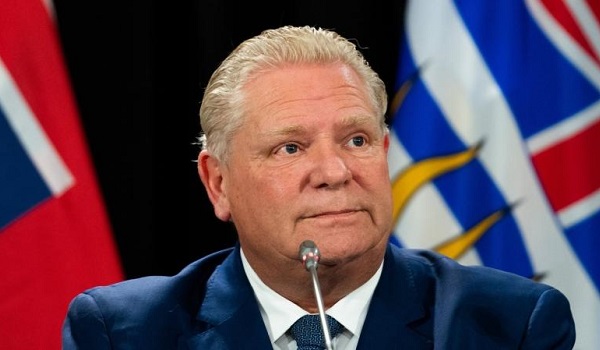Ontario urges Ottawa to help provinces pay up the cost of housing asylum-seekers
Ontario is asking the federal government to pay up and cover the costs of supporting and housing asylum-seekers, as Quebec’s premier said his province is willing to give up some funding so that other provinces can take in larger numbers.
Speaking at the final news conference at the Council of the Federation’s annual summer meeting — this year hosted by Nova Scotia Premier Tim Houston — Premier Doug Ford said Ontario spends $1 billion a year and that asylum-seekers are often left in limbo by the federal government.
“When it comes to asylum-seekers, Quebec and Ontario bear the brunt of it,” Ford told reporters. “We’re just asking the federal government to give our fair share. We’ve spent over a billion dollars in Ontario every single year.”
Ford said he talks to newcomers “and they want to work. They want a better life, and it’s taking way too long to get their working visa from the federal government.”
The premiers’ demand follows Mayor Olivia Chow’s long-standing request to Ottawa for additional help for her cash-strapped city.
While the federal government finally came forward with $97 million for Toronto last year to help refugees, there are still asylum-seekers lined outside of the Peter Street homeless intake centre.
That was part of a one-time infusion of $362.4 million for refugee resettlement across Canada.
City hall says there are still more than 4,000 asylum-seekers in shelters each night, which nearly matches the number of homeless people in them.
Ford said families are often stuck “staying in a hotel like they do on the airport strip up in Toronto … or a couple of kids down playing in a parking lot in Scarborough” when they “want a better life. They want to work like everyone else … but we have to make sure we have shelter, we have homes for them. We really need the support of the federal government.”
Quebec Premier François Legault said “it’s not fair” his province receives $750 million for asylum-seekers, while other provinces “receive nothing. We would prefer to receive less in the future and have less asylum-seekers.”
Alberta is also taking in proportionally more newcomers, said Premier Danielle Smith, noting some 70,000 Ukrainian evacuees have recently settled in her province.
“Aside from a small amount of money at the beginning, there are hotels that need to be funded, there are schools that need to be funded” as well as health-care needs and other programming, she said.
“We want to do our part, but … when provinces are shouldering larger burdens,” Ottawa needs to step up, Smith added.
The 13 provincial and territorial leaders held talks on a number of issues over the past three days, including health care, federal equalization payments and relations with the U.S.
Looming large is the outcome of the U.S. presidential election and the impact that could have on trade relations.
Earlier Wednesday, Ford noted that when tariffs were placed on Canadian goods by the Trump administration, talks were held with U.S. trade representatives and the matter was resolved within a few weeks.
“We won’t hesitate if they put tariffs on any of our products,” Ford said when asked about tough talk coming from presidential candidates regarding trade.
“We do $500 billion of trade in Ontario alone with the U.S. … We’re the number-one customer to 17 states and number two to 11,” Ford said, adding other provinces have strong trading ties as well.
“We are an economic powerhouse,” the premier added.
Prince Edward Island Premier Dennis King said no matter the outcome of the election, there will “be good discussions and (we’ll) continue the good relationship” with the U.S.
Ford takes over as chair of the premiers’ group Aug. 1, and said U.S. relations will be key.
“Hopefully we’ll plan a trip as the new administration, whoever it is, gets sworn in” after the November election, Ford said. “We’ll have a conversation … and (stress) it’s not just ‘buy America,’ it’s about ‘buy North America.’
“At the end of the day, it’s Canada, the U.S. and you can put Mexico in there, against the rest of the world, no matter if it’s South America, Asia, Europe,” Ford told reporters.
Ford also said federal government duplication in some programs — notably in the recent student nutrition program — overlaps with provincial efforts and costs more, wasting taxpayer dollars.
“And you know what happens?” Ford said, “The premiers get pissed. It’s as simple as that. They just jump in there and think they know better what we know, what we deal with on a daily basis.”
This article was first reported by The Star













